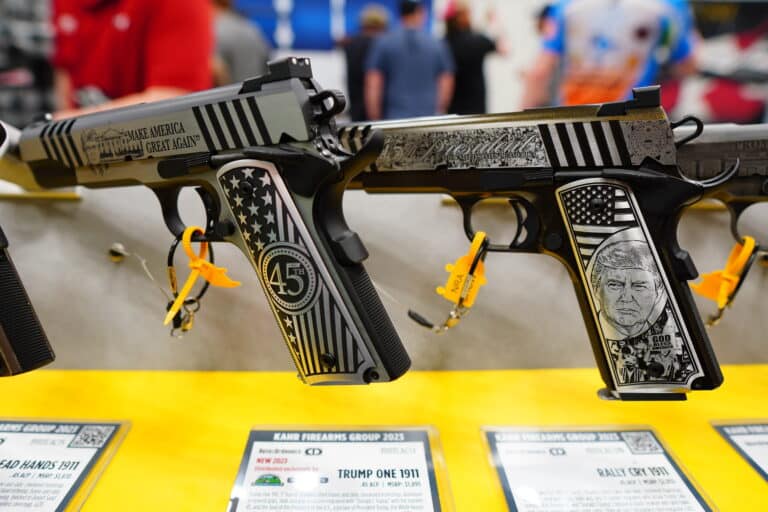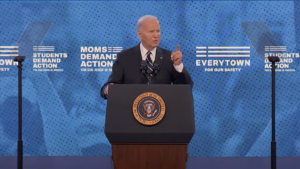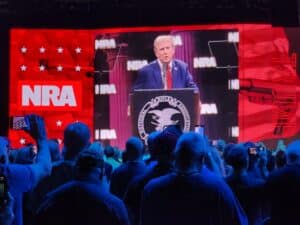He can’t legally accept it, and you can’t legally transfer it to him.
On Monday, former President Donald Trump created a stir at a campaign stop in South Carolina. During a visit to a gun shop, Trump was presented with a Glock that featured his face. He liked the gun and declared he was going to buy one. The person presenting it to him offered to give him the gun for free. Campaign spokesman Steven Cheung posted a video of the interaction and claimed Trump had in fact bought the gun.
This would be a pretty unremarkable exchange for somebody running as a pro-gun candidate under normal circumstances. Of course, the Trump 2024 campaign is happening under anything but normal circumstances. The former president, running after losing re-election in the previous election, is facing multiple felony indictments across four different jurisdictions.
That makes the exchange remarkable because it is illegal for anyone under felony indictment to buy new guns. 18 U.S.C. § 922(n) makes it a federal crime for anybody under a state or federal felony indictment to “receive” guns.
The prohibition is a bit different from the better-known ban on convicted felons possessing guns. Just handling a gun doesn’t necessarily trigger the crime. So, Donald Trump can likely keep and shoot the guns he might already own. But he can’t buy new ones or receive them for free.
The Trump Campaign seemed to acknowledge this fact because, after I pointed it out, Cheung deleted his initial claim that Trump bought the gun and reversed course. He told CNN’s Kristen Holmes that Trump did not buy the gun. It was a rare reversal from the Trump Campaign, and it shows how seriously they took the potential of being charged with another felony.
And anyone considering gifting Donald Trump a gun should take the potential punishment equally seriously. The same federal law that bars him from receiving a gun makes it illegal for anybody else to give him one.
18 U.S.C. § 922(d)(1) makes it unlawful for anybody “to sell or otherwise dispose of any firearm or ammunition to any person knowing or having reasonable cause to believe” they are “under indictment for, or has been convicted in any court of, a crime punishable by imprisonment for a term exceeding one year.” It’s going to be difficult for anybody who does so to argue they aren’t aware he’s facing multiple felony indictments. After all, it’s one of the biggest political stories in American history.
As with most federal gun prohibitions, there has been a significant dispute surrounding this provision since the Supreme Court handed down New York State Rifle and Pistol Association v. Bruen last year. A number of criminal defendants challenged the constitutionality of the law afterward. And a few have had success.
One case even garnered national attention. Jose Gomez Quiroz, a Texas man accused of buying guns while under felony indictment, had his charges tossed after a United States District Judge found the prohibition didn’t meet Bruen’s history and tradition standard.
“Although not exhaustive, the Court’s historical survey finds little evidence that § 922(n)—which prohibits those under felony indictment from obtaining a firearm—aligns with this Nation’s historical tradition,” Judge David Counts, an Obama appointee who was reappointed and confirmed under Trump, wrote in United States v. Quiroz. “As a result, this Court holds that § 922(n) is unconstitutional.”
The Fifth Circuit has already held oral arguments in the appeal of Judge Counts’ ruling but hasn’t issued a ruling. So, the decision by Counts, while potentially influential, is not binding precedent. Additionally, several other district judges have come to the opposite conclusion.
Judge Ana de Alba’s ruling earlier this year is the most notable to uphold the ban on people under felony indictments receiving guns. That’s because the Biden appointee ruled against dropping the charges even after doing the Bruen test. She ruled the ban fit with the nation’s history and tradition of firearms regulation.
She specifically identified two kinds of Founding Era gun restrictions that were analogous to the modern law. The first dealt with bans on selling or giving guns to certain groups of people “deemed to be dangerous including those unwilling to take an oath of allegiance (to the crown and later the states), slaves, and Native Americans.”
“In this historical backdrop, the historical dangerousness laws as well as Section 922(n), cover only a subset of persons that were (are) perceived as more likely to commit crimes and not the public at large,” Judge de Alba wrote in United States v. Bartucci. “It can also be said that the burden imposed by Section 922(n) is less than the historical dangerousness laws because Section 922(n) only prohibits an individual under indictment from shipping, transporting, or receiving a firearm for a temporary period; it does not prohibit possession of a firearm.”
The second kind of analogous restriction she found was surety laws that forced people accused of being dangerous to post a bond in order to bear arms.
“As Bruen instructs, the best way to undertake a historical analysis is by understanding the scope the Second Amendment had when it was adopted in 1791,” she wrote. “Thus, the surety laws then in place only required a justice of the peace to decide whether the accused’s Second Amendment rights were to be restricted; they had no ‘selfdefense’ exception. Accordingly, although Section 922(n) may not be a ‘dead ringer for historical precursors,’ this Court finds that it is sufficiently analogous to pass constitutional muster.”
Judge de Alba said in her decision that there has been an almost even split among lower court judges on the question of the law’s constitutionality. Three have upheld it while four have struck it down. Jake Charles, a law professor at Pepperdine University, put the count at 10-4 in favor of upholding the law in a piece published a few months after de Alba’s decision was handed down.
That all makes for high drama as the court cases move forward, and even provides Donald Trump an opportunity to challenge the law on Second Amendment grounds if he wants to. But it doesn’t change anything about how the law is currently being enforced. There is no injunction at either the circuit or national level.
As of now, it remains illegal to sell or give a gun to somebody under felony indictment. So, bottom line, don’t give former President Trump a gun with his face on it. Or any other kind of gun for that matter.
UPDATE 10-02-2023 5:02 PM EASTERN: This piece has been updated to include the estimate from Professor Charles.






